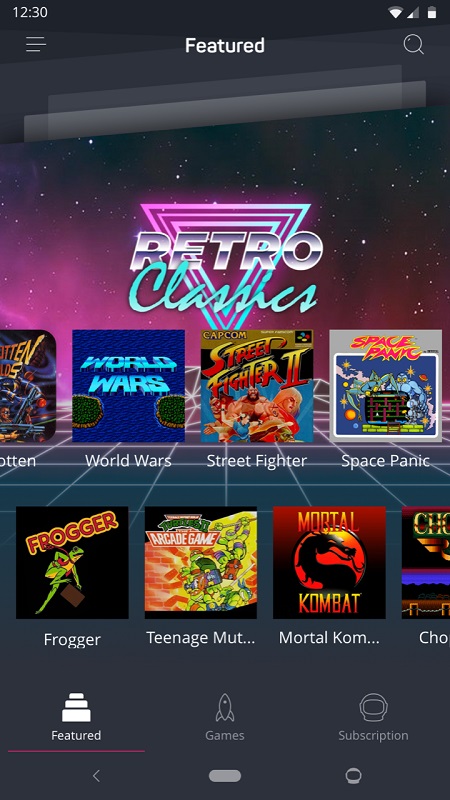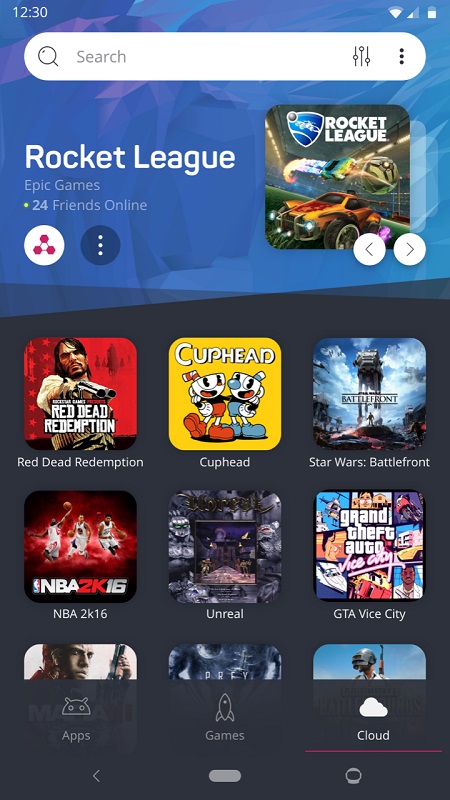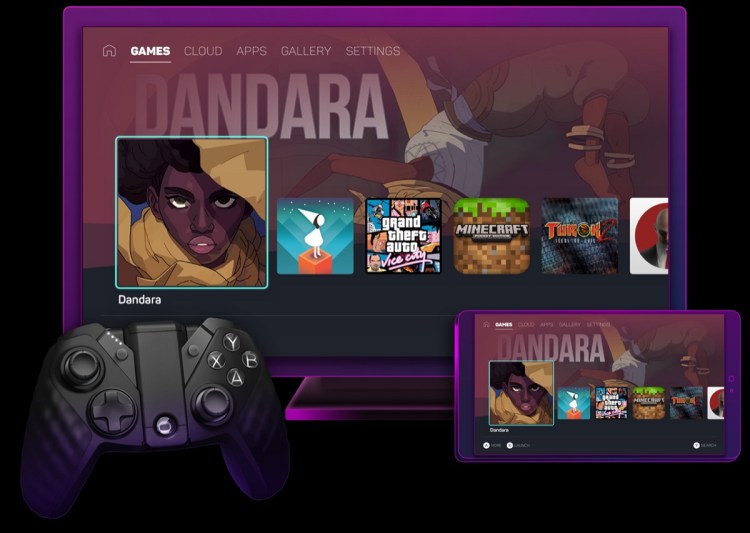Andy Kleinman is finally talking about what his startup Wonder is doing. The Los Angeles company is taking on a number of players in the game industry — including the Nintendo Switch and Android smartphones like the Razer Phone 2 — with a hybrid gaming system that unites all of the ways that we play.
The WonderOS software powers an Android-based platform that combines mobile and TV-based console gameplay in the same device. That sounds like a Switch but with some very different features. And Kleinman hopes to license the WonderOS to a variety of companies that can use them to make various hardware devices. Kleinman said the company’s own hardware is not likely to ship. Rather, it is a proof point that shows potential partners how it can be done.
The idea is that somebody needs to make a real phone and hybrid device for gamers and entertainment fans, Kleinman said in an interview with GamesBeat. Wonder is in the midst of pulling together its launch plans and funding to make it all happen. Wonder has 25 employees, and its investors include Grishin Robotics, 8VC, Kevin Lin, NBA Commissioner Emeritus David Stern, Shakira, Gerard Piqué, Moonshots Capital, John Pleasants, Owen Van Natta, Jeff Kearl, Hayao Nakayama and Baron Davis.
Here’s an edited transcript of our interview. You can sign up for the beta at Wonder.com.
June 5th: The AI Audit in NYC
Join us next week in NYC to engage with top executive leaders, delving into strategies for auditing AI models to ensure fairness, optimal performance, and ethical compliance across diverse organizations. Secure your attendance for this exclusive invite-only event.

Above: Andy Kleinman is CEO of Wonder.
GamesBeat: I was always curious about you guys. When we talked last, you couldn’t tell me anything about what you’re doing. It sounds like you’re going a little more public now.
Kleinman: Long story short, we’ve been working on this while. Everything takes longer than you think, especially when you’re doing something so big involving hardware and software. We also had bad luck with a big strategic partner that we started working with, and they didn’t deliver the things they were supposed to deliver. We wasted a bunch of time and had to regroup. There were some other things on our own. We’re getting there.
I come from bootstrapping companies and launching apps and games in beta really quickly. This is one of those things that, if we want people to put it on their phones and work with companies to work with our software, we need to make sure it’s perfect before we even talk to them. It just took a bit longer than we wanted.
GamesBeat: How long has it been now?
Kleinman: It’s been a bit over three years since we started. It’s been a while. But you go back and you look at when the first Xbox or the first iPhone or the first big iteration of something that had real impact in an industry — the first version always takes a long time. Then you can keep iterating every year. The fact that there’s a new iPhone every year doesn’t mean that the first one took a year to make.
Given the constraints of doing things as a startup — that’s the other part. A lot of the stuff we’re doing, building software of this magnitude, is stuff where you usually have companies with hundreds of millions of dollars and thousands of employees working on it. We have a team of 25 people full time, and then partners and contractors. Everything takes longer when you’re a small company.

Above: Wonder has 25 people in San Francisco.
GamesBeat: What have you revealed so far?
Kleinman: On the new website, we’re finally showing what we’ve been working on. We always talked about this idea that mobile is going to be the future. Apple and Google are the biggest gaming platforms in the world already. But in a way, it’s sort of by accident. It’s not like they put a lot of effort into building features or applications or making the experience incredible on mobile. You can play games on mobile, but it’s nowhere near what it is on a console or PC. Not just the performance of the games, but even the integration with third-party services or social features or things that make gaming better.
One thing we thought about, going back to the original thesis, is that mobile is the future, but the experience can improve. There are ways to make the mobile experience more like what it is on other gaming platforms. The second thing is that we’re finally seeing a glimpse of Stadia, where companies are starting to work on game streaming. We’ve been thinking this is coming for a while. The reality is that there’s a lot of companies working on the infrastructure, but not a lot of companies working on the user experience and the interface, what that’s going to look like.
I don’t know what Google is doing in the background. I assume they’re thinking about this stuff. But for the most part, they introduced Stadia as a separate entity, as opposed to an evolution of Google Play. That expectation doesn’t help the industry. What’s happening now, if you’re a gamer, you already need to have seven different devices to be able to play all the games out there. With cloud gaming it’ll get even worse, because if every publisher decides to have their own direct-to-consumer platform, and other companies like Google and Amazon and Verizon–
GamesBeat: Or even Wal-Mart.
Kleinman: Wal-Mart, exactly! What’s going to happen is, everyone wants to build the Netflix of games. What that means by default, similar to what happened with video, is that everybody will have a separate walled garden with a separate subscription and a separate interface and a separate app. If you’re a user and you want to watch a show, you’re wondering where you can even watch it. You don’t know where to get it.
Too many companies right now are still in this phase where they’re thinking about the Netflix of games. The way we thought about it is, how do you build the Apple TV of games, where you’re building a platform where everything can coexist? You’re building the best experience to be able to find everything you want, from having a universal search engine that will find games no matter the platform, to integrating games from different places. It’ll integrate all the different features.
If Xbox decides to have their own streaming platform — you can still use Twitch on Xbox, but they push you to use Mixer. For a lot of people that’s annoying. The way we’re doing it, we’re trying to be the United Nations. We’re trying to build something where we’re a fully level playing field. All we care about is making the best experience for the user. We want to be able to collaborate with everyone.
A lot of the problems you see, why Activision and Ubisoft and everyone is working on their own platform, is because Microsoft keeps buying first-party studios. It makes sense for them to do that, but if I’m Activision or Take-Two, I start wondering. These guys are competing with me internally, and they control the platform. That doesn’t give me a lot of security around my business. Now they want to build their own thing, which most of these companies don’t know how to do.
That’s the opportunity we see. There’s a lot of people trying to build isolated experiences. We feel like there’s an opportunity to build — we’re doing this from the point of view of the user. What do they want? They want one device where they can play games on multiple platforms, where they can play with their friends no matter where they are. When you think about the success of Fortnite and what Fortnite means to the industry, apply that to everything. It’s the idea that it should be free to play. It should be open. It should be portable. Everything should be done to make the best user experience, not to justify some old-school business transaction that hasn’t evolved.

Above: Wonder wants to gather your games together, from mobile to retro.
GamesBeat: The interesting thing about Fortnite is that they came up with the killer app, and that enabled them to enforce this point of view on the rest of the industry. If you want to have Fortnite, you have to allow cross-play. You have to enable independent stores. They were able to bring so many innovations to the whole industry, but at the gunpoint of, you don’t get Fortnite.
Kleinman: Exactly. That’s what they did with bypassing Google Play. They were the first ones that had the power to do that in a way that was meaningful. I don’t agree — there’s a lot of stuff that Google Play has done an incredible job with. We have Google Play on Wonder. We’re working with them. But I do think that when you think about the economics of the industry, taking 30 percent of revenue is a lot. If you’re taking that, there has to be very tangible value that you’re giving, that nobody else has.
In a closed ecosystem like Apple they can get away with it a little easier. Eventually that also may not fly for them. But that’s what’s happening. It happened in the music industry. My first startup way back in high school was in the early days of digital music. I saw very closely — I negotiated some of the first digital music contracts with the record labels. I worked with the labels. I worked with everybody for digital distribution rights. It was the same thing. People eventually find a way to get the content they want, and if you’re a platform that gets too greedy about the economics, the content might find a different way of getting there. You have to find a balance where the business is big enough for everyone.
In gaming there’s a lot of potential for revenue. We know that gamers are very willing to spend money. But they don’t want to get ripped off by the developer or the platform or any partner they work with. They want the best experience. What’s happening is that some of these bigger companies that have been around a long time, they’re so focused on trying to defend their business that they stop thinking about what the customer wants. That’s a big part of the focus for us.
GamesBeat: Do you feel like Fortnite created a bit of a slipstream for you?
Kleinman: I think it validated a lot. When we first started talking about this stuff, when I had the idea — I left Scopely and went on this research project. I started working on the idea and slowly recruiting people to build it. I had a lot of people that were skeptical. I think there’s been a number of validators of our idea so far. One, obviously, was the Switch. The Switch was one of the first things to show that people care about portability for their games and experiences. Something that’s made with gamers in mind. But the problem with the Switch is it has a lot of limitations. Nintendo is good and some things and not good at others. Still, it was a big validator for us.
Fortnite was another big validator for us. Obviously when you see things like the Razer phone and the Black Shark phone and the Asus Rock phone — those things didn’t exist before. Now the idea of having a more powerful portable device for gaming makes sense to a lot of people. The challenge for those is that they’re still, for the most part, hardware solutions. The reality is that the hardware is very commoditized. As much as you try to innovate in certain aspects of the hardware, the experience is not going to be that different than if you’re playing on the newest Samsung device or whatever else.
What we see is that the big differentiator has to be the software. How do you make the user experience unique? Being able to play multiple types of games on a mobile device, not just mobile games, but also making the overall experience better so that users feel like they have something unique. The phone manufacturers, the OEMs, also feel like they have something that differentiates the device from the masses on the software side. It can open a door for them to make revenue somewhere else. The problem is that even though the revenue from the Google Play store is huge, the manufacturers make nothing. If those guys can get access to a piece of those revenues, it incentivizes them to make a better experience for the user.
We’re trying to do something that ultimately benefits everyone. To go back to the TV analogy, what Roku did well was they said, “We’ll build this experience for TV from the user’s standpoint. You can have universal search. You can get any app. You can get Apple TV, Netflix, whatever you want, and it’s seamlessly integrated.” But they also went to TV makers, because TV makers – like phone makers – are not necessarily experts in building software. They rely on third-party software. A lot of the smart TV experiences were not that great. They said, “Listen, we’ll give you our software.” TV makers now get great software, Roku gets distribution in every TV, and users end up winning because they get a great TV with great software.
That’s what we think is happening with smartphones. When I first had the idea and started talking to a lot of these companies, they were pretty dismissive. We didn’t really have anything to show them. It was just an idea. But now we’ve started going and telling them that things have changed. The margins on hardware are getting thinner. There’s more competition in the space and less differentiation. Apple takes 80 percent of the revenue. Everyone else on Android, even though Android is much bigger as an ecosystem than Apple — Apple makes the money because they sell you the whole experience across hardware, software, services, and content.

Above: WonderOS
GamesBeat: What are some of the bigger decisions you made around getting to where you are today?
Kleinman: It’s been an interesting journey. My idea started as the Wonder OS. The origins of it were — I was looking at Cyanogen and what they were doing. It was interesting. They’ve had a lot of users, but they weren’t able to monetize them. It’s an interesting concept, but the problem is, they have no differentiation. It’s an alternative to Android, but it’s not that different. It reminded me of what happened with the Windows phone, which was a cool product, but there was nothing unique about it that would make any iOS or Android customer switch.
At the time, what I said was — I talked about this with a few people from Microsoft, some of whom ended up becoming investors in Wonder. Microsoft should have done the Xbox [phone] model. They would have had a differentiated product with a good brand, with a community of people behind. It would have been a smaller niche compared to the iPhone in terms of users, but it would have been a lucrative business. They didn’t do that.
I started thinking about what that would look like. We thought about it from a software standpoint. But I started talking to people from hardware companies and we weren’t getting a lot of traction. They were saying, “Yeah, maybe?” We didn’t have anything built. They were dismissive of our ability to do it. We ended up going and building it, and also building our hardware as well. We did it because we wanted to show that we could do it, but also it allowed us to work with all the suppliers for smartphones. All the big names are the same across all the flagship smartphones. We were able to work on optimizing the software to work better with processors, with memory, with battery makers. We could do things that would improve performance and build a better experience.
We built prototypes and software. Fast forward two years and change, with all the ups and downs, and we suddenly started going back and showing — this was around Mobile World Congress this year. We showed a lot of these companies what we did. Suddenly they were saying, “Wow, this is really cool.” And we said, “You can have this on your device.” We weren’t trying to launch a device and compete with everyone. We want to partner with you and take advantage of your users and distribution and grow together.
GamesBeat: Just to clarify, you’re making an OS that’s available to a bunch of folks, but you’re not necessarily going to do your own Wonder device? Is there a strategy to do both, or just to do one of those things?
Kleinman: We built our device, like I said, as a proof point, as a way to make the experience work and optimize it, and also as a way to benchmark what the metrics should be. Now we can compare our device to other devices and see how our software will perform. The challenge, always, when you make — I learned this making games. When you’re making games for iOS versus Android — making stuff for iOS, you optimize for a handful of devices. When you make games for Android you have thousands of combinations of OS and device. It’s more complicated to make things work well.

Above: Andy Kleinman, CEO of Wonder
When we design things for one device, that allowed us to create a lot of efficiencies. Now we can replicate that one by one in multiple devices. WonderOS is not going to be overnight available on every Android device. It will be a slow rollout as we start working closely with different partners. We’re not launching our device to the public. Our device is for internal R&D. We’re launching — beta testers that have devices we’re already working with can start getting the software as early as the next couple of months. We already have a few thousand people actively testing it, maybe more. More and more people will start jumping on the beta, and they’ll be able to install Wonder OS on their existing device.
As we start working closely with more OEMs, more devices will have Wonder OS available. Some of them may have limited edition versions that focus on entertainment and gaming. Some of them may put it on their flagship devices. We’re still working this out.
GamesBeat: Whoever adopts this might be able to easily produce something like a Razer phone, then?
Kleinman: Exactly. We’ve talked a lot with Razer about — the biggest thing about how we pitch a company is we want to be an ally to everyone. We can be an ally to phone makers. We can be an ally to publishers. We can be an ally to anybody making any sort of application for gaming. We want to create an environment where whatever you want to do as a gamer, you can access it on a Wonder device. Ideally you’ll have a better experience than you’d have on a device that’s not optimized for you.
Because we’re not building those things — we’re not building our own streaming service. We’re not building our own games. We’re agnostic. We get to work with everyone. We’re not about the economics, about the terms. We’re about trying to make the experience better for the user. The data we collect about what users want is all used to make the experience better for them. We’re not selling it. We’re not doing anything weird with it. We’re just trying to make the experience better.
GamesBeat: What are the next things that are going to happen here?
Kleinman: We’re doing beta testing with a number of users. We’re now negotiating some of these OEM deals with companies we’ve been talking to for a while about having Wonder OS work on their devices. Some of them are existing devices and some of them are new devices. They’re existing companies that have millions of users. The plan is to keep making the product better and start rolling it out slowly to more customers and more partners.
GamesBeat: It sounds like an interesting opportunity for innovation here.
Kleinman: I think so. Right now we’re seeing a lot of interest from — the good thing is we’re working both directly with publishers, and also with existing platforms. Anybody who’s trying to build that Netflix of games, or any sort of store, could live on Wonder, because we’re not limiting what people can do. We’re just trying to collaborate with everyone. That’s a rare thing. Nobody’s really doing that. Everyone’s trying to mark their territory. We’re saying, “We’re willing to share our technology, share our insights, and find a way to get the most value for everyone who works with us.”
If a developer or a publisher has a certain game we know is appealing to a certain audience in Wonder, we’ll surface it to them. We’re not trying to do all these things purely to take advantage of the situation. What is going to deliver the best for the users on the platform.
GamesBeat: If I were Epic, I’d do a Fortnite phone and use you guys for something like that.
Kleinman: We were talking to everyone about things we could do. It’s easy to make a one-off version of something. What Epic has been smart about is that they — Fortnite is a huge success, but they have the big picture. They have the engine. They have the store. They have other things. Fortnite is a great proof point that, if you do things in a certain way with the right technology and the right distribution and the right economy, then the sky is the limit. Now they have a lot of experience doing it right.
Our goal is to work with companies like them and everyone else who is innovating, because we can do it together. It’s not about anyone doing it on their own. The more companies try to isolate themselves and work on their own — that’s not great for the industry. Everyone ends up having similar versions of a thing anyways. It’s all disjointed. It creates a worse experience.
We’ve wanted to put this on quietly and see the reaction, which has been pretty cool over the last 24 hours. But we’re still interested in telling our story and getting more people to know what we’re doing. I’ve been mostly focused on the business connections, more than anything else. That’s the priority now. We’re raising capital. There’s all this stuff going on. The good thing is, we have all this imagery out now, so we can show a lot more. We’ll be able to demo it at E3 and show how it works.
GamesBeat: How many people do you have working for you? How much money have you raised so far?
Kleinman: We’re about 25 full time, and a few other people here and there. We’ve announced $14 million. We’re now in the middle of something with that, but the only public statement we made about money was a couple of years ago, when we announced $14 million. That was when we really started putting the pieces together.


